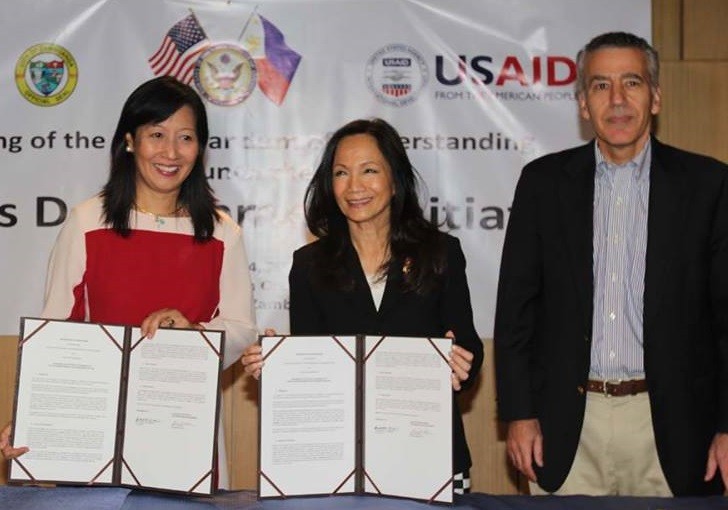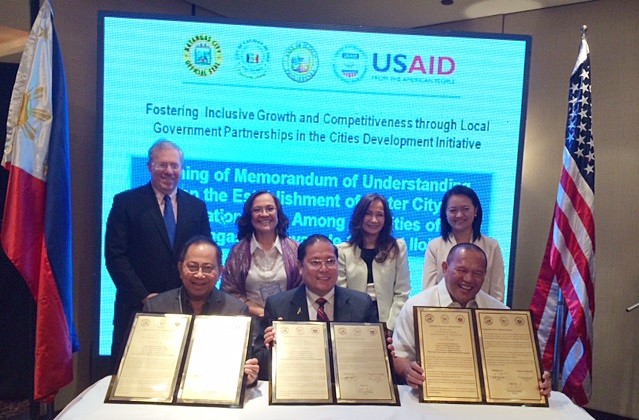
In November 2011, the Government of the Republic of the Philippines (GPH) and the United States Government (USG) agreed to a Partnership for Growth (PFG) to address the most binding constraints to economic growth and development in the Philippines. The PFG represents a partnership between the Philippines and the United States to promote broad-based, inclusive and resilient growth. The USG works with the GPH, the private sector and civil society organizations to help put the Philippines on an accelerated growth trajectory that benefits the majority of its population.
Under PFG, USAID is working to strengthen the economic competitiveness and resilience of second-tier cities outside of Metro Manila through the Cities Development Initiative (CDI). CDI seeks to advance the development of second-tier cities as engines of growth that is inclusive, environmentally sustainable and resilient. Depending on the most urgent needs of the city, USAID will provide a range of technical assistance, drawing from resources in economic growth, health, energy, environment, governance, and education to assist the cities achieve inclusive and resilient growth.
Cities as Engines for Growth
In general, nations’ growth trajectories are closely linked to the urban environment, where cities act as engines of growth. If urban growth is well-planned, cities can accelerate regional economic growth, innovation, and prosperity. While megacities like Metro Manila command much more economic and political attention, smaller cities (less than one million inhabitants) are the locus of urban growth and urban population concentration. Important contributors to national wealth and productivity, these secondary cities are a vital focus for development programming and growth in the Philippines.
CDI Approach and Objectives
CDI activities aim to encourage economic growth in urban areas outside of Metro Manila. CDI will improve the investment climate in secondary cities by:
- Fostering an open and competitive business climate;
- Facilitating investments in high-value industry clusters;
- Enhancing human capital development and promoting industry-academe linkages;
- Strengthening health services; and
- Ensuring urban environmental resiliency.

Selecting Pilot City Partners
Partner cities were selected based on the following criteria:
- An enabling environment for growth
- Credible city government committed to good governance
- Committed local partners
- Engaged private sector
- High likelihood of producing impact
Following an extensive scoping exercise in early 2012, USAID chose to pilot this innovative urban development approach with the cities of Batangas, Cagayan de Oro and Iloilo. Subsequently, USAID and local governments signed Memoranda of Understanding, providing the basis for promoting these cities as engines of growth through mutual responsibility.
Assessing Local Challenges and Developing Action Plans
Following the selection of the first three pilot cities, USAID, in partnership with the cities, conducted a constraints analysis to determine the cities’ priority sectors and projects needed to accelerate growth. Based on these analyses, they are developing City Action Plans (CAPs) to address economic growth, education, environmental resiliency, and health challenges. USAID and its city partners, including local government, civil society and the private sector work together, with mutual commitment and responsibility, to finalize and implement these CAPS.
CDI Approach: Expected Impact in the Philippines
CDI aims to create more vibrant and livable cities for balanced urban growth. By uniting in partnership, USAID and the target cities expect to contribute to more economically thriving growth centers outside of Metro Manila. CDI provides an opportunity for USAID to strengthen its programming by being more strategic and focused in pursuit of shared objectives across its portfolio in the areas of economic development and governance, education, health, and environment, energy, and climate change.







Comment
Make a general inquiry or suggest an improvement.